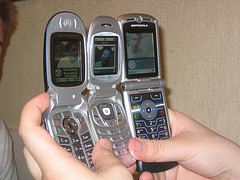 A new study, available in the February issue of Pediatrics, by psychologists at the University of Alabama at Birmingham (UAB) has found that children crossing the street are in greater danger when they are using a cell phone. Many states have introduced legislation banning handheld cell phone usage for drivers, not that I see that stopping people in California, and in 2008 New York proposed banning mp3 and cell phone usage by pedestrians. Multi-tasking can be difficult for adults, especially in a setting where there are motor vehicles involved, and it is therefore imperative as parents that we pay attention to how our children handle similar situations.
A new study, available in the February issue of Pediatrics, by psychologists at the University of Alabama at Birmingham (UAB) has found that children crossing the street are in greater danger when they are using a cell phone. Many states have introduced legislation banning handheld cell phone usage for drivers, not that I see that stopping people in California, and in 2008 New York proposed banning mp3 and cell phone usage by pedestrians. Multi-tasking can be difficult for adults, especially in a setting where there are motor vehicles involved, and it is therefore imperative as parents that we pay attention to how our children handle similar situations.
The study collected data from 77 children, aged 10 to 11, using virtual reality software, three screens that simulated a real Birmingham crosswalk, and a touch pad to register when the child entered the crosswalk. They were instructed to traverse the virtual crosswalk six times without a cell phone and then six times while using a cell phone. UAB Media Relations, released a summary of the results that found
it took the children who were on a cell phone 20 percent longer to begin crossing the street, and they were 43 percent more likely to be hit by a vehicle or have a close call in the virtual environment. In addition, the children looked both ways 20 percent fewer times before crossing the street and gave themselves 8 percent less time to cross safely in front of oncoming traffic when they were on the cell phone.
So far, the link of cell phone usage to cancer and loss of sleep has not deterred parents from allowing their child to have one. It is estimated that cell phone ownership by children between the ages of 8 to 12 will rise to 54 percent by the end of 2009. In a newsletter titled “Keeping Your Family Safe” from November 2003, Teen Research Unlimited stated that “33% of children ages 12 – 15 own their own cell phone” and “the number jumps to 52% for 16- and 17-year-olds”. I received my first cell phone at 16 and I shared a calling plan with my father which restricted my cell phone use, texting was a novelty I did not get to use until I was in college. This is the brave new world though, where kids use SMS (Short Message Service) and MMS (Multimedia Messaging Service) on a constant basis, some families add messaging plans to their cell phone contract solely for their child’s use. Hopefully, we have not reached the point where parents lack the attentiveness to realize the immediate and long term risks that mobile devices carry for children.
France has already banned the sale and advertisement of cell phones to children and personally I think that banning advertisements targeting children for cell phone ownership is an idea worth entertaining. I understand the concept of a cell phone as an emergency life-line, although where I live it is about as useful as a paper weight since we do not have cellphone reception, but I do not think it warrants cell phones becoming a standard commodity for every child.
Furthermore, adults already produce enough electronic waste, especially due to cell phone ownership, the increased ownership by children compounds this problem. Despite the wonderful programs available to recycle cell phones, as long as people, children included, are lured into owning the the latest and greatest in electronics, handling the resulting waste will continue to be an environmental concern.
Image: compujaremy on flickr under Creative Commons license.
Leave a Reply